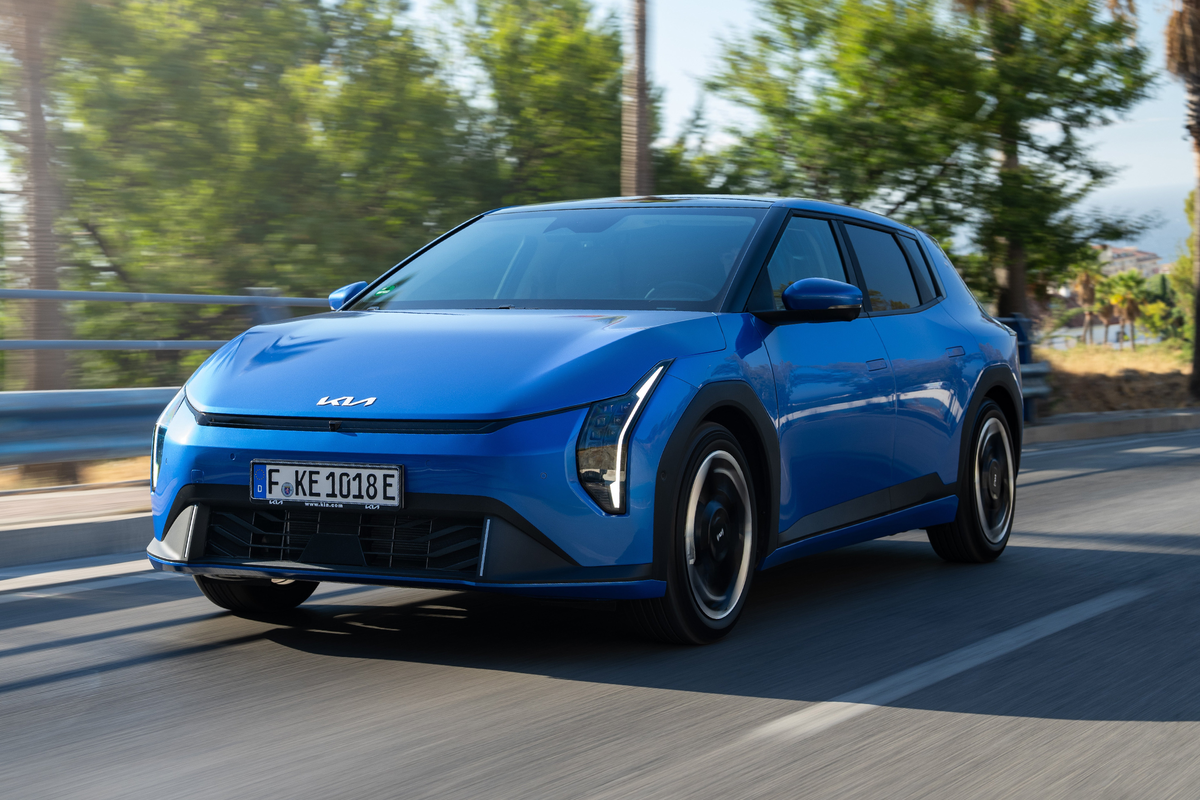
Following in the tyre tracks of the Kia EV3 (current World Car of the Year) and the EV9 (winner the year before), the Kia EV4 and its Fastback sibling continue Kia’s relentless march towards EV dominance. These are electric saloons that offer something genuinely different in a crowded market: style, substance, and surprising value.
The standard EV4 – which is more a low-slung fastback hatch than a traditional saloon – is arguably the pick of the range. It’s eye-catching without being flashy, efficient without being clinical, and easy to live with day-to-day. It offers a surprisingly cushioned ride despite the 19in wheels in higher trims. Even the steering, while light and slow to respond, is ideal for most drivers in real-world use. It’s responsive enough around town, while motorway cruising is quiet and unflustered.
The Fastback version is Kia’s first proper electric saloon, and while it certainly turns heads with its boat-tail rear and extended rear overhang, it sacrifices some practicality to achieve the look. Boot space increases on paper, but the lower height and narrower aperture mean it’s harder to load than the standard EV4.
Both models shine inside. Kia’s commitment to sustainable materials is front and centre, with recycled PET bottles, bio-based faux leather, and BTX-free paints all used throughout. Comfort is a highlight – those headrests are honestly among the most relaxing you’ll find in any car. And with a class-leading suite of tech, the EV4 feels every bit a match for far pricier German or Californian rivals.
If you’re after a family-sized EV that nails the essentials – range, value, comfort, tech – while throwing in a dose of eco-conscious cool, the EV4 hits the spot. We’d go hatch over fastback on looks, practicality and price.
How we tested
I was introduced to the twin EV4s in southern Spain, taking them on a long road trip that included motorways, twisty roads up in the hills, small country lanes, towns and even a trip to the supermarket. I drove both body styles to see how they compared, and even tried out the back seats when someone else was behind the wheel.
Kia EV4: From £34,630, Kia.com
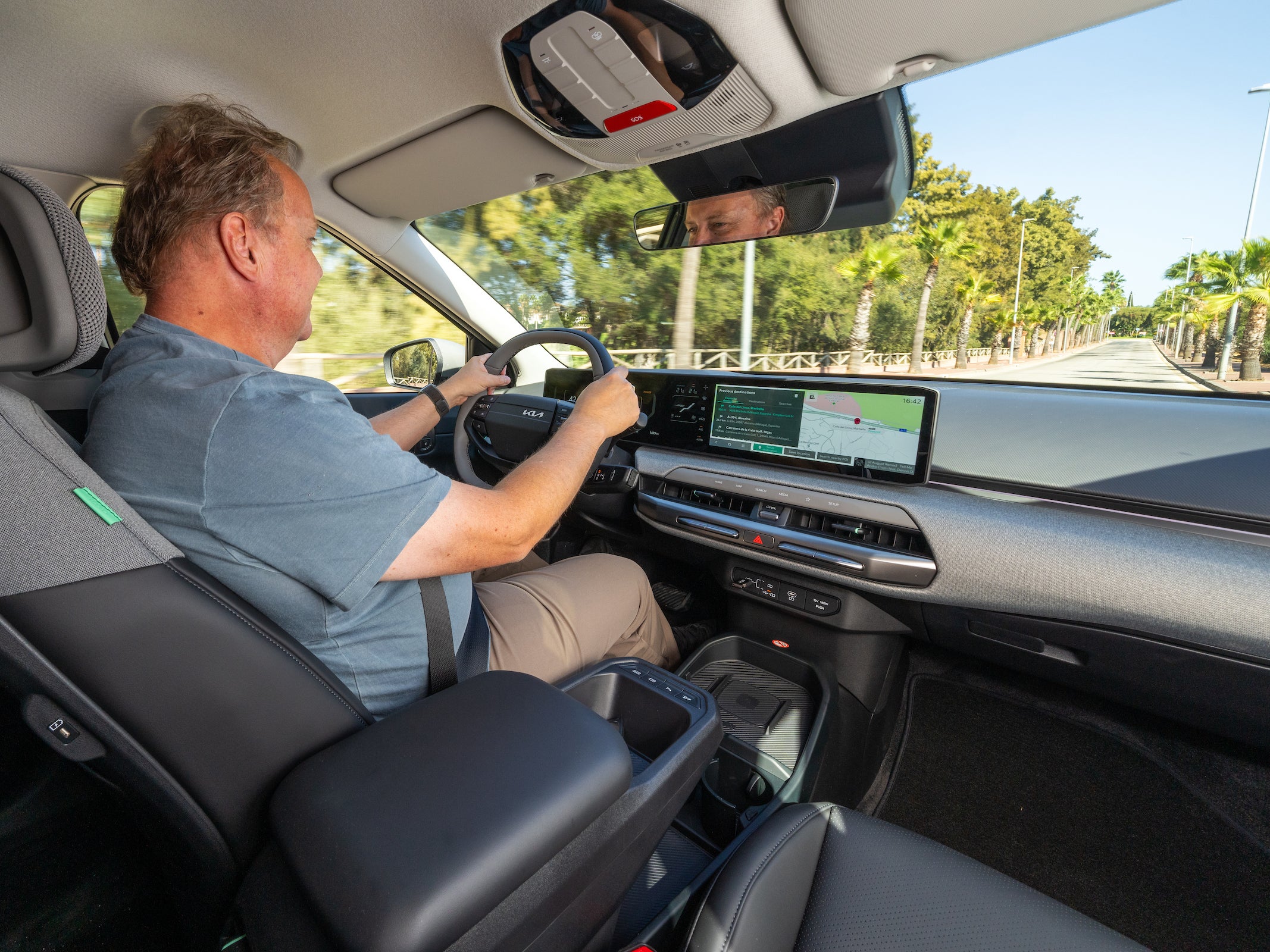
Independent rating: 9/10
- Pros Excellent ride, ompressive range, high-quality, spacious and sustainable interior
- Cons Slight whine from the motor at low speed, Fastback compromises looks and boot
Kia EV4 specs
- Price range: £34,630 to £46,230
- Battery sizes: 58.3kWh & 81.4kWh
- Maximum claimed range: 391 miles
- Miles per kWh: 4.3
- Maximum charging rate: 150kW
Battery, range, charging, performance and drive
Kia’s battery and drivetrain options in the EV4 are familiar, but that’s no bad thing – the EV3’s system impressed us, and it’s carried over here largely unchanged. That means two battery sizes in the hatchback: a 58.3kWh unit good for 273 miles of range, and a larger 81.4kWh pack claiming up to 391 miles. The Fastback skips the smaller pack and only comes in 81.4kWh long-range guise, with a maximum of 380 miles.
Real-world efficiency is excellent as it always tends to be in a Kia, helped by the EV4’s sleek shape. The hatch has a drag coefficient of just 0.27, while the Fastback’s is a super-slippery 0.23, among the best in the class.
Charging performance isn’t quite up there with the 800V EV6 or EV9, but it’s still fast enough for most. Kia quotes a 10 to 80 per cent charge in just under 30 minutes on a 350kW DC charger at speeds up to 150kW.
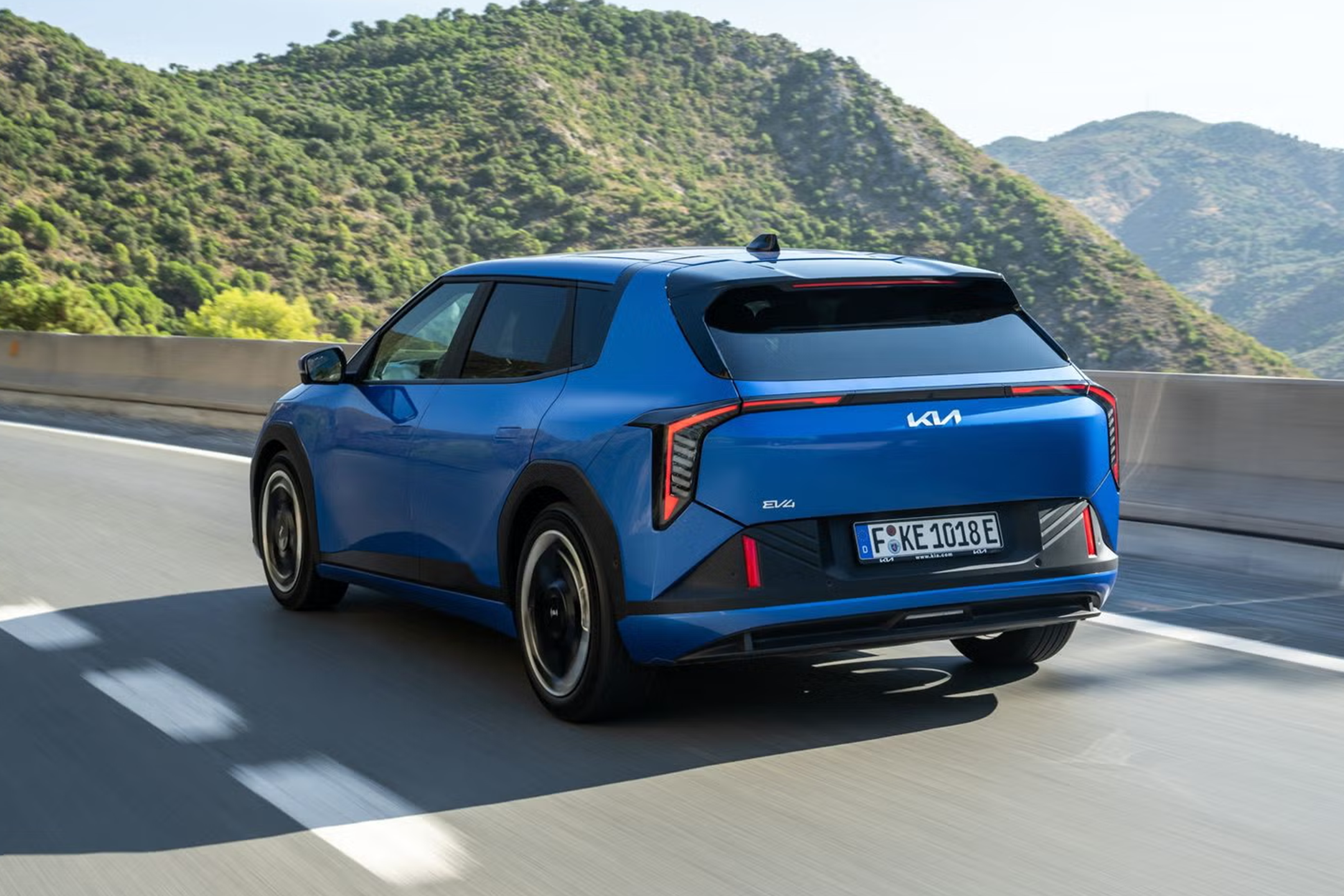
All models are front-wheel drive for now, producing up to 215bhp, with 0–62mph taking as little as 7.5 and 7.9 seconds depending on body style and version. There’s enough poke for overtakes and smooth power delivery– though there is a faint whine under light throttle that occasionally cuts through the silence if you’re not playing music.
Ride comfort is one of the EV4’s standout qualities. It soaks up potholes well, never feeling unsettled or crashy, even on rougher roads. Sport mode adds a bit of weight to the steering, which remains light and undemanding – great for commuting, though keen drivers might wish for more feedback.
Interior, practicality and boot space
Inside the EV4, Kia has pulled off that rare trick of combining minimalist design with family-friendly usability. The dashboard layout echoes that of the EV9 and EV3, with horizontal lines, a floating centre console, and a clean sweep of screens. But it’s the quality and eco-focus that really impress.
Seats are trimmed in bio-based PU material, while the headrests, dashboard, and even the carpets are made from recycled materials. It doesn’t feel cheap – far from it. In fact, the EV4’s interior feels more grown-up and premium than you’d expect at this price point. Even the lower ‘Air’ model looks the part, though GT-Line and GT-Line S add two-tone faux leather, alloy pedals and ambient lighting.
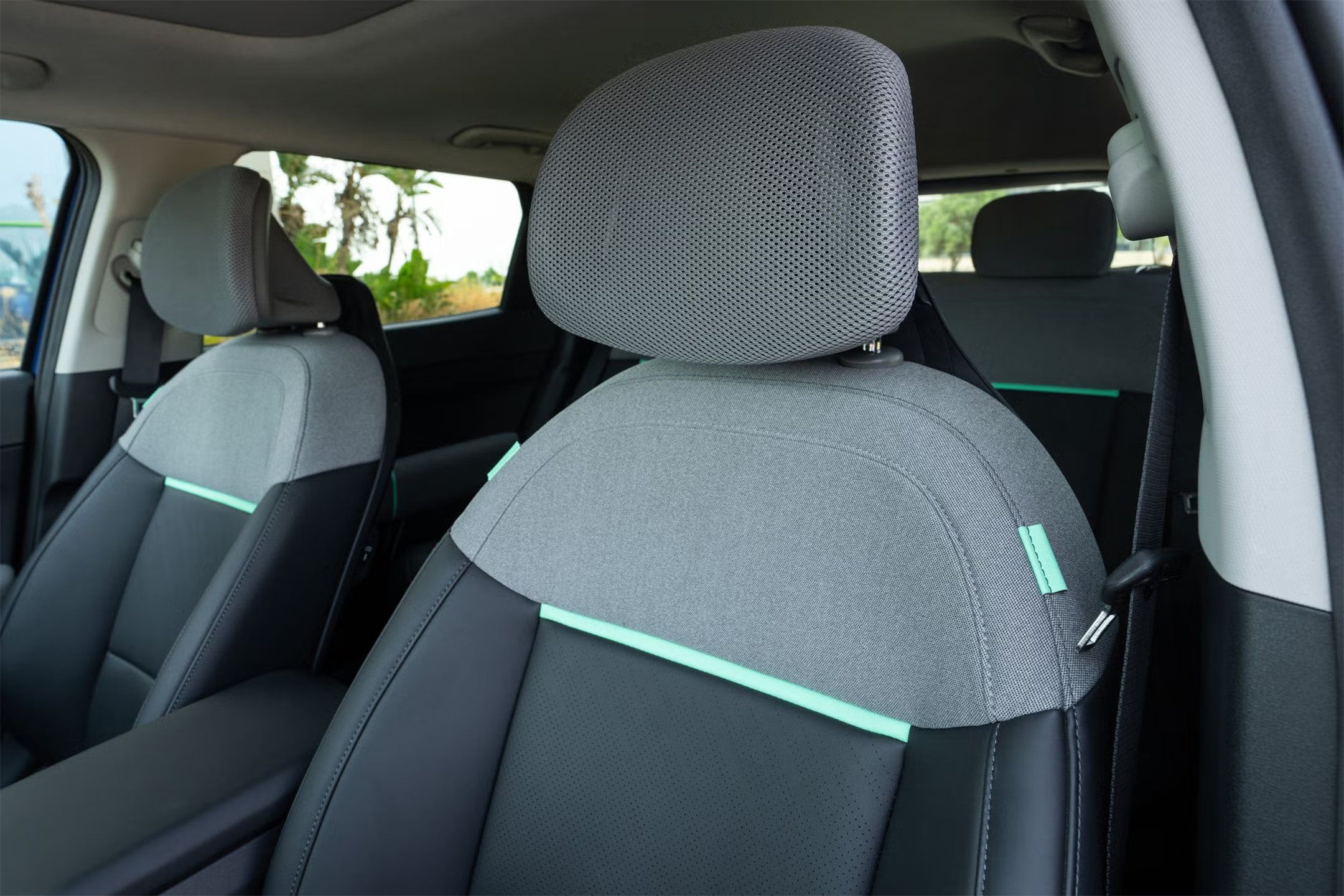
There’s loads of space up front, with good visibility and a clever open storage shelf beneath the floating centre console. In the back, the EV4 makes use of its long wheelbase (2,820mm) to provide decent rear legroom. Headroom is okay in the Fastback, though the sloping roofline does nibble away at space.
Boot space is a tale of two formats. The standard EV4 hatch offers 435 litres with the seats up, and up to 1,415 litres folded. It’s square, useable, and has a wide opening – perfect for pushchairs, suitcases or a trip to the recycling centre. The Fastback technically offers more space at 490 litres, but its lower boot floor and shallower height mean it’s harder to load larger or taller items.
Still, for most families, both will be practical enough – and it’s good to have the choice between sleek style and outright usability.
Technology, stereo and infotainment
Tech is an area where Kia continues to punch well above its weight. The EV4 gets the brand’s now-familiar triple screen layout: two 12.3in curved displays and a 5.3in heating and ventilation touchscreen in between. It’s a clean and elegant design, but I was a bit frustrated that some of the smaller central screen is obscured by the steering wheel. At least the voice control seemed to work to overcome that problem.
The infotainment system is quick and intuitive, with swiping gestures, shortcut buttons that sit below, and full wireless Apple CarPlay and Android Auto across the board. Kia’s interface is simple to master – there are no deep dives into menus, and no lag of the touchscreen. You also get Bluetooth multi-device support, voice commands, and seven years of over-the-air updates included as standard.
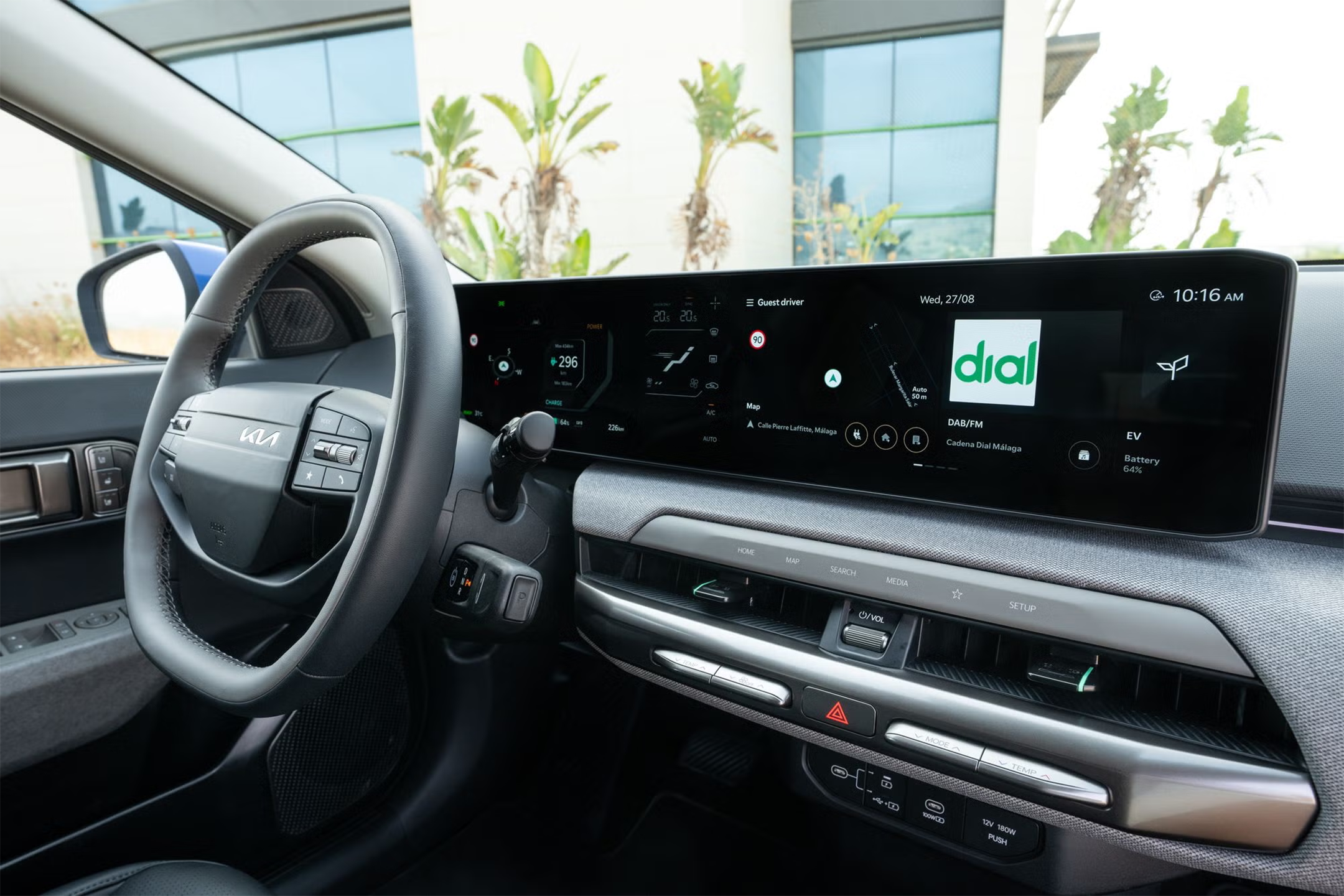
New for the EV4 is Kia’s AI-powered assistant, driven by ChatGPT. It can help with route planning, suggest places to stop, answer questions about the car, or just entertain the kids with games, jokes and trivia. Say “Hey Kia” to activate it – a surprisingly useful party trick on longer journeys.
GT-Line S models add Kia’s ‘Theatre mode’ and ‘Rest mode’, turning the front seats into reclining loungers while dimming the cabin lights and letting you stream Netflix, Disney+ or YouTube from the central screen. Rear seat heating, wireless charging and a head-up display are all available further up the range.
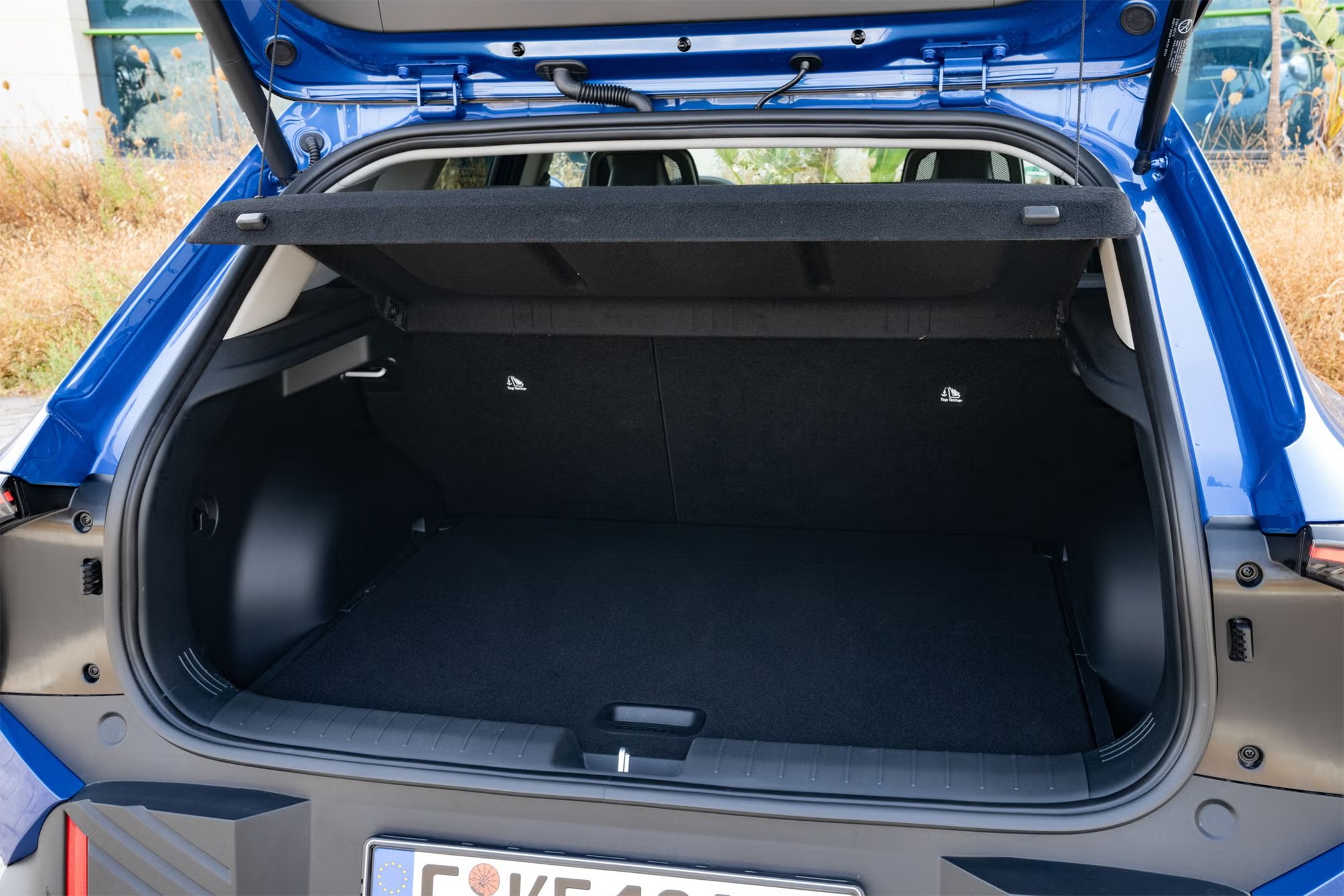
Audio starts with a 6-speaker stereo in the Air trim, stepping up to an 8-speaker Harman Kardon system in GT-Line S. It’s punchy and clear – not quite audiophile level, but good enough at this price.
Safety tech is as comprehensive as it gets: adaptive cruise, blind spot monitoring, Highway Drive Assist, 360-degree cameras and even Remote Smart Parking Assist. It’s all standard or available depending on trim – and again, far better equipped than most rivals, including cars costing far more.
Prices and running costs
The EV4 range kicks off at £34,630 for the 58.3kWh Air model, rising to £44,730 for the GT-Line S Long Range hatch with a heat pump. The Fastback starts at £40,830 – around £1,500 more across the range – and tops out at £46,230.
For the money, both cars represent excellent value. The equipment list is generous, efficiency is impressive, and Kia’s warranty remains unbeaten – seven years on the car, and eight years on the battery and motor.
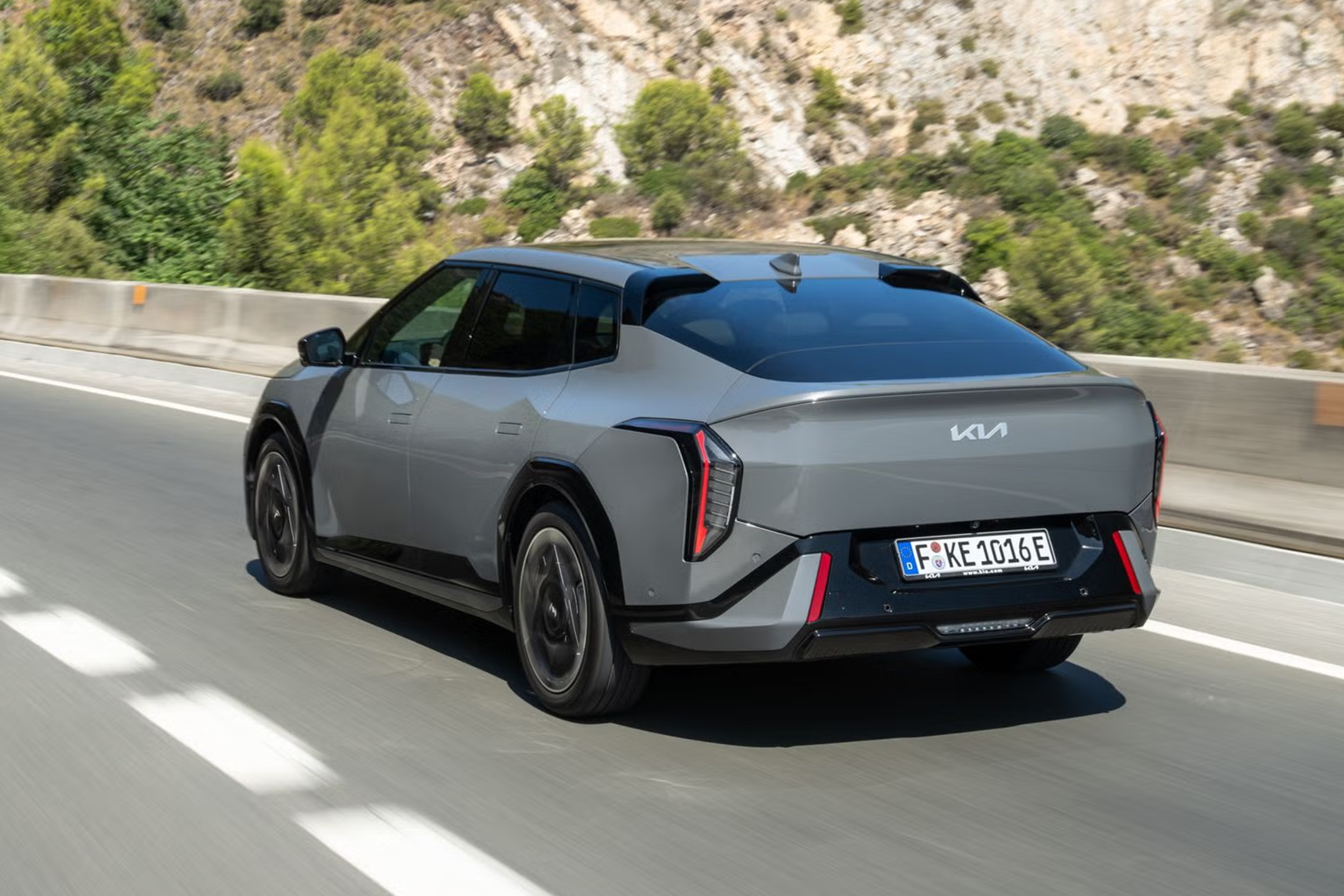
If you do 10,000 miles a year, charging mostly at home on a smart overnight tariff, you could spend considerably less annually on fuel – significantly undercutting petrol or diesel rivals.
Insurance groupings are expected to be competitive, and service costs will be lower than traditional ICE models. And when it comes time to sell, Kia’s current EVs hold their value well – especially the more popular trims like GT-Line.
Fleet buyers will appreciate the EV4’s low Benefit-in-Kind tax rates, and we suspect the mid-spec GT-Line Long Range will be the sweet spot for both private and company buyers alike.
Kia EV4 rivals
FAQs
How long does it take to charge?
On a 350kW ultra-rapid charger, the EV4 can charge at 150kW from 10 to 80 per cent in around 29 to 31 minutes, depending on battery size. On a home wallbox or workplace 11kW AC charger, a full charge takes around 7 hours 15 minutes for the long-range battery. A heat pump is optional on top models and helps with winter efficiency.
How much does it cost – is it worth it?
Put simply, yes. The EV4 is well priced, offers plenty of kit for the money and is efficient, too. The range starts at £34,640 going up to £46,230.
Does Kia replace batteries for free?
Kia’s excellent seven-year/100,000-mile warranty applies to the whole car, and the battery and motor are covered for eight years. It’s one of the most comprehensive EV warranties on the market.
Why trust us
Our team of motoring experts have decades of experience driving, reviewing and reporting on the latest EV cars, and our verdicts are reached with every kind of driver in mind. We thoroughly test drive every car we recommend, so you can be sure our verdicts are honest, unbiased and authentic.
The verdict: Kia EV4
The EV4 brings all the best bits of the brilliant EV3 into a sharper, lower, premium-feeling package. Most people will still prefer the SUV usefulness of the EV3, but if you fancy something a bit lower and more traditional, the EV4 hits the mark. The Fastback’s looks and price won’t suit everyone, I’d stick with the hatchback. What is clear, though, is that this is another winner for Kia.
BYD Sealion 7 vs Tesla Model Y: Which mid-size SUV is best?
Best electric cars 2025: Top 11 EVs to buy and the ones to avoid
MG IM5 review: The closest rival yet to the Tesla Model 3
10 fastest charging EVs we’ve tested
Renault 4 review: Retro family-friendly SUV driven in the UK
Best family electric cars 2025: Practical seven seater EVs tested
Old Nissan Leaf batteries are ending up somewhere weird
Think electric cars are expensive? My new EV costs me less than a couple of posh coffees a day







